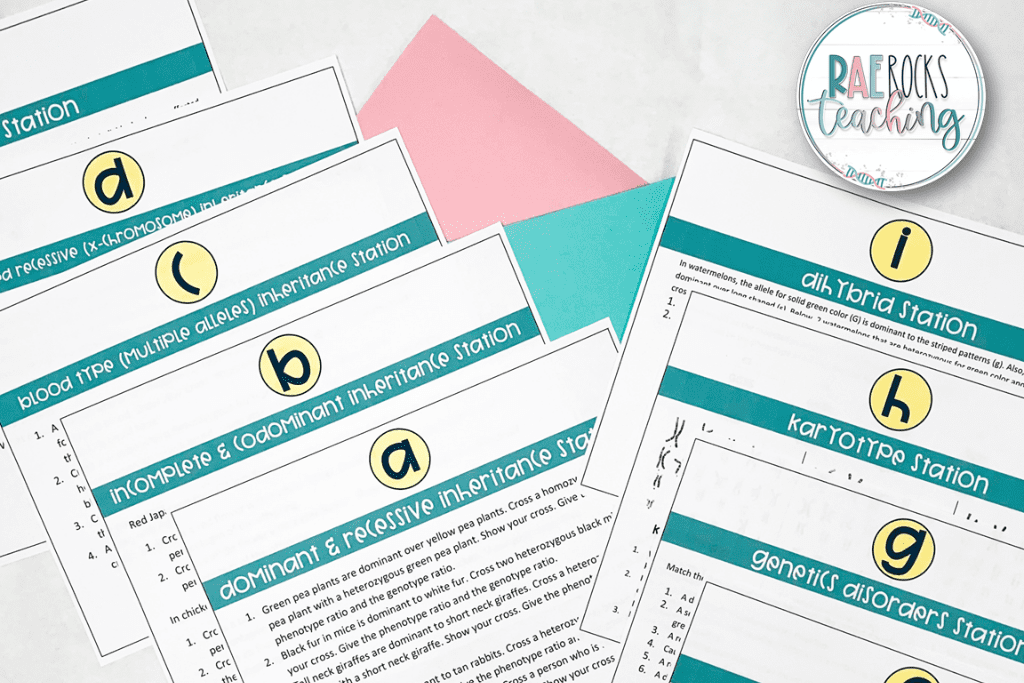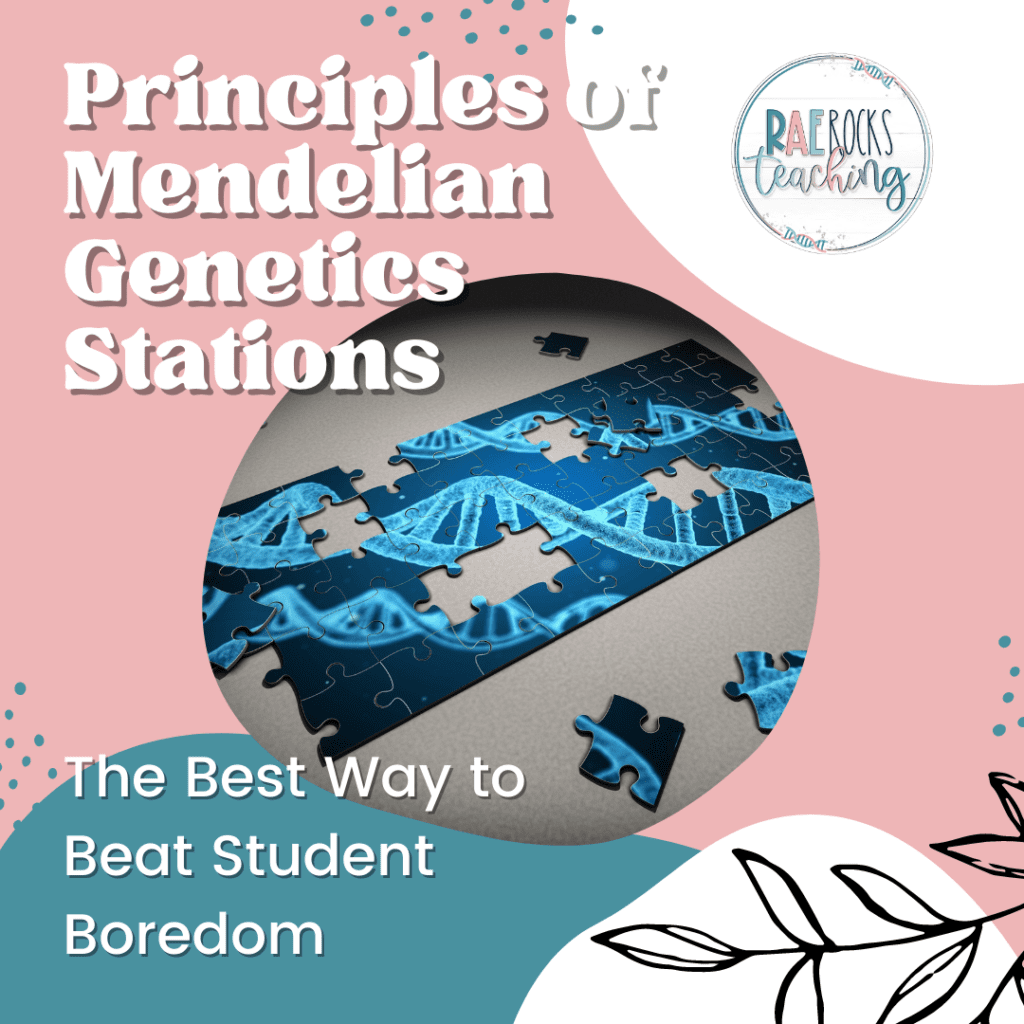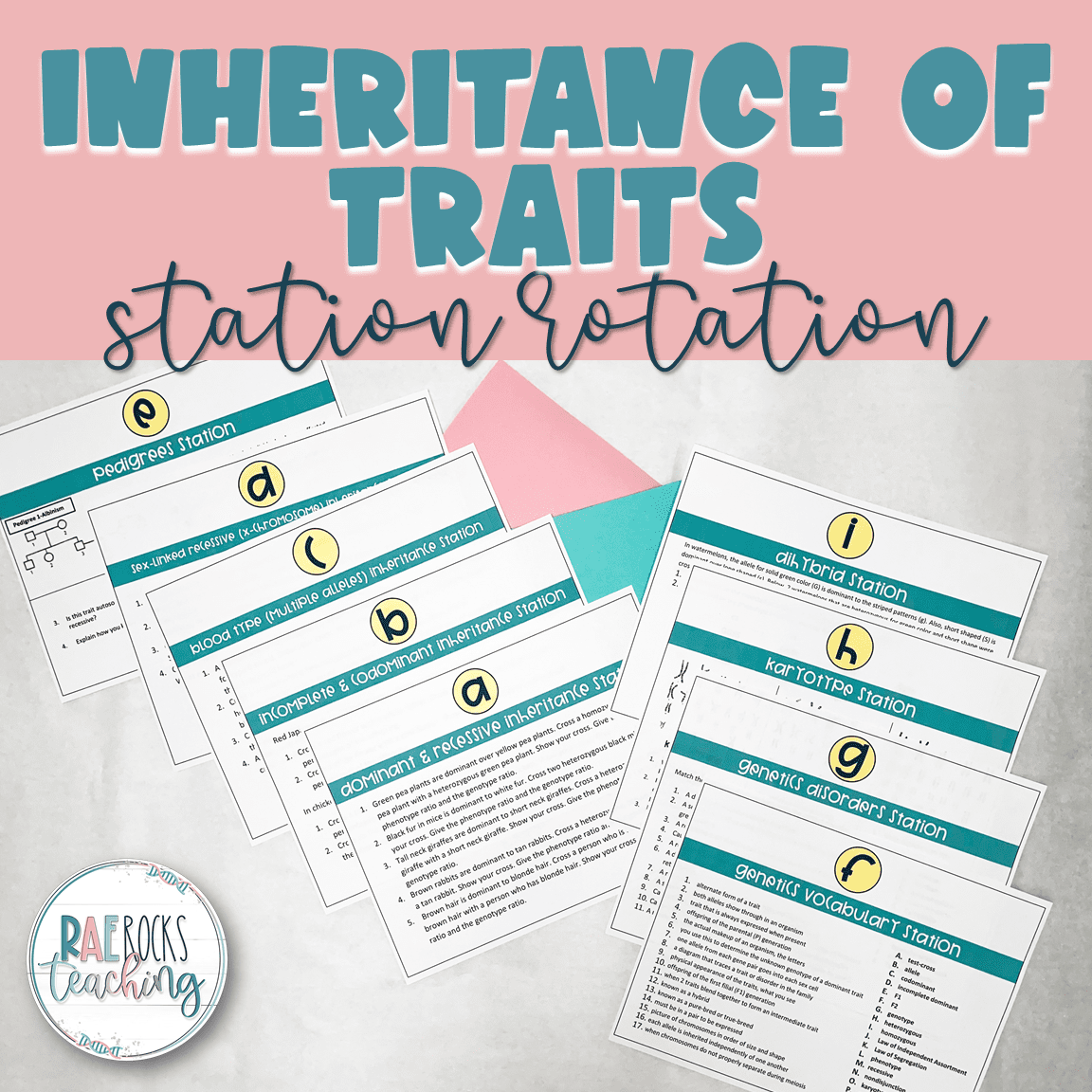Have you searched for Principle of Mendelian Genetics worksheets lately? I bet you are not alone. What about mendelian genetics review or study guide? If that is you, then keep reading because I have a better way to review.
Principles of Mendelian Genetics
I have found the secret to getting students collaborating and working out problems they run into…stations. I LOVE STATIONS! They work great for so many things such as review, inquiry activities, taking notes on simple topics, etc. There are endless ways to use stations to get students up and moving. I especially love using stations to review for our Mendelian Genetics Principles Test.

-
Save
This unit in my opinion is fun and interesting, but sometimes students really get tripped up on the different types of Punnett squares. The topics we cover in this unit are as followed:
- Basic inheritance
- Incomplete & Codominance
- Blood type crosses
- Sex-linked (X-chromosome) crosses
- Pedigrees
- Karyotypes
- Dihyrid crosses
- Genetic disorders
- Inheritance related vocabulary
As you can see, there is a lot we cover, and can easily become overwhelming to students. I found that by using stations, students actively work together to solve problems and help each other.
Mendelian Genetics Principles
During the unit, I cover a different topic each day. Yes, we review along the way, however, things get confusing once we get to blood type and sex-linked crosses. What I have seen is that students want to put X’s and Y’s on everything, even if it’s not sex-linked. It’s a common issue, but one that can easily be resolved. I use the Inheritance of Traits Stations to review ALL of the Principles of Mendelian Genetics.
How To Group Students
There are 9 stations spread out in my room, mainly around the lab tables. I divide students up into groups of 3-4 based on their level of understanding. Typically, I use the review games we have played throughout the unit as a guide to see who does or doesn’t know the content, that way I can quickly create groups. I pair up groups with varying levels, but never the high with low students. In the past, I have found that both get frustrated with each other. Sometimes the higher-level students will not have the patience to help the lower-level students. While the lower level students become increasingly confused because they aren’t grasping the concept. I have found that matching up students from high level to medium level and medium level to lower level works best. They can all help and learn from each other without the added pressure or anxiety. It works seamlessly!

-
Save
How to Run the Stations
Once groups are set, I hand out their student answer sheet and go over the instructions. I use a timer for each of the stations to tame the chaos and keep each student focused. They know ahead of time that each station must be completed in the time given. I give them a few extra minutes at the end of our rotations to go back and finish any they didn’t complete. This is a small minority of students, because I try to build in ample time without lots of waiting around. I set the timer for 7-8 minutes depending on my classes. Usually I can tell the pace after the first 7 minutes are up. You can either add or subtract time according to the students pace. Too much time will cause students to stand around, while too little time causes students to rush through just to get done. It all just depends on your class and the time you have for class. I have 90-minute blocks, so there is more flexibility in how much time I can allow. You could get through the stations in a 45 minute class as well.

-
Save
What Each Principle of Mendelian Genetics Station Includes
In Mendelian Genetics, there is a great deal of information that we cover. This is a huge chunk of our standards and a large portion of what the students will see on their Biology EOC (especially Georgia). My students do extremely well in this section of the EOC and I credit it to getting the students involved with the material. Stations give students the opportunity to actively learn the material. Each station focuses on one of the principles to really hone in on that topic. Since we usually do these a day or two prior to the test, I have them use their notes to help them complete the stations. The only way students will learn the material is to practice and refer back to their notes.

-
Save
Principles of Mendelian Genetics Stations I Use
Station 1 | Basic Inheritance
This station has 5 problems relating to only dominant and recessive Punnett squares. Students must show their crosses and give the phenotype & genotype ratios.
Station 2 | Incomplete dominance and Codominance
This station has several problems on incomplete dominance as well as a few on codominance Punnett squares. Students do their crosses and must give the phenotype percentages.
Station 3 | Blood types
I include several crosses in which students must show their work and identify the percentage of the offspring that will have each blood type.
Station 4 | Sex-linked (X-chromosome)
Students are asked to cross a variety of different sex-linked traits such as hemophilia, and give the percentages of offspring affected.
Station 5 | Pedigrees
Here, I have 2 pedigrees in which students must answer questions about who is affected and if the traits being followed are dominant, recessive, or sex-linked.
Station 6 | Vocabulary
I mainly have this station so that students understand the vocabulary required to truly understand each cross and how to interpret the results.
Station 7 | Genetic disorders
At this station, I have selected some of the main genetic disorders that I want students to be familiar with and the type of inheritance.
Station 8 | Karyotypes
There are 3 karyotypes at this station that students must interpret and answer questions about. I also include a reference table to help them figure out the answers.
Station 9 | Dihybrid cross (2 versions: One advanced & one novice)
The reason I have two versions is because each class is different. I may want some of my students to practice doing a dihybrid cross from start to finish. Or, I may want my class to just be able to interpret a dihybrid cross. This differentiates for those learners.

-
Save
Have I convinced you to try incorporating stations into your class yet? Hopefully, you are feeling energized and ready to shake up your review sessions.
If you are overwhelmed and stretched too thin to create stations, then check out my done for you Inheritance of Traits stations.
I love sharing with y’all and would love to connect on IG or Facebook. Follow me and send me a DM with what you need more of because I’m here to help! If you are looking for even more inspiration, follow me on Pinterest!
Don’t forget to grab your FREE GUIDE with 15 Engaging Activities for Biology

-
Save
Share via:










3 Responses
Hello,
I am wondering as its review game. How you cover the content of the basic inheritance. I mean first student needs to learn the content of each topic and then will have review stations.
Hey there! I cover the content prior to reviewing. I use these stations as a review day before the test.